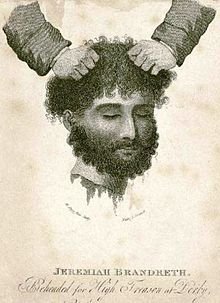Jeremiah Brandreth

Jeremiah Brandreth (* 1790 in Wilford ; † November 7, 1817 in Derby ), also known as "The Nottingham Captain", was a British stocking maker and one of the leaders of the Pentrich uprising . He was due to betrayal by the train executed .
Life
Little is known about Brandreth's origins, which has given rise to much speculation. Apparently he served temporarily in the army, trained as a stocking maker and then lived in Sutton-in-Ashfield with his wife and two children . Probably he had already joined Luddism in 1811 , which was directed against the beginning industrialization of the textile industry .
In 1817 a protest movement had formed in the region, whose supporters mainly met in Wakefield . Brandreth seems to have been more involved on a regional level. In Wakefield, simultaneous riots were initially planned in different places. Then they wanted to rally around Nottingham and march on London . The uprisings were prepared by Joseph Mitchell, who was accompanied by WJ Richards (aka "Oliver the Spy", German "Oliver the Spy"). It is not certain whether Brandreth met Oliver himself. After rumors of his role surfaced, Brandreth was the only one who continued with the insurrection plans. Brandreth is therefore seen as a victim of the intrigues of Home Secretary Henry Addington, 1st Viscount Sidmouth , who took tough measures against the Luddites and possibly also used agent Provocateur Oliver.
On June 9, 1817, Brandreth and his co-conspirators Isaac Ludlam and William Turner led a poorly armed group of about 200 to 300 men, mostly hosiery and ironworkers , from Pentrich in Derbyshire to Nottingham. In attempting to on farms more weapons requisition , shot Brandreth a servant. He promised his men that Nottingham would surrender before they even arrived and that they would move on to London from there and take the city together with troops from Yorkshire . At the same time he threatened to shoot deserters . When a small band of hussars approached the next day at Giltbrook , near Eastwood , the men threw away their weapons and dispersed. Brandreth initially managed to escape. He was later arrested while trying to contact his wife, who was pregnant with the third child.
The process
35 people were tried in a special court, avoiding any mention of Oliver's involvement. Brandreth refused to provide further information about the background to the uprising until his execution. Brandreth, William Turner, and Isaac Ludlam were sentenced to death by hanging, disembowelling, and quartering . The sentence was mitigated by George IV , the then Prince Regent .
On the scaffold , one of the men stated that they had been manipulated by Lord Sidmouth and "Oliver the Spy". This claim was later investigated by Edward Baines of the Leeds Mercury . Baines found enough evidence to make this public. The three condemned to death were hanged; then their heads were cut off with an ax.
The board on which the bodies were lying when they were beheaded is now in the Derby Museum .
Much has been speculated about Brandreth's motives. While some historians characterize him as a desperate man and a hot head, others have declared him a revolutionary workers leader.
literature
- John Belchem: Brandreth, Jeremiah (1786 / 1790-1817) . In: Oxford Dictionary of National Biography . Oxford University Press, Oxford 2004; online edition, accessed May 2011 on Nov. 3, 2013
- Summer D. Leibensperger: Brandreth, Jeremiah (1790-1817) and the Pentrich Rising . In: Immanuel Ness: The International Encyclopedia of Revolution and Protest . Blackwell Publishing, 2009.
- Edward P. Thompson : The Origin of the English Working Class . Suhrkamp, Frankfurt 1987, ISBN 3-518-11170-1 .
Individual evidence
- ^ Chambers Biographical Dictionary , 1990, ISBN 0550160418 , p. 1346.
| personal data | |
|---|---|
| SURNAME | Brandreth, Jeremiah |
| ALTERNATIVE NAMES | The Nottingham Captain |
| BRIEF DESCRIPTION | British insurgent |
| DATE OF BIRTH | 1790 |
| PLACE OF BIRTH | Wilford |
| DATE OF DEATH | November 7, 1817 |
| Place of death | Derby |
